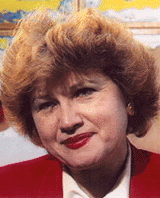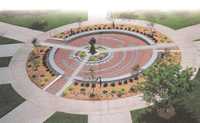
Linda Weir-Enegren
is honored with a Pathway Paver from Phil Enegren, Katie Stannard, Benith & Craig Macpherson, Frank C. & Betty Brosius, Helen B. Healy,Terry Mann, Jack Spines, Susan J. Metz, Robin Russell, David A.Williams, Stacy Schmidt, Joseph F. & Donna J. Bunk, Devore Foundation, Marla Chandler, Gayle A. Nobles, Chi Epsilon-Epsilon/Sigma/Alpha, Kenneth & Lois Short, Glorene R. Haney, Caroline & Douglas S.Pringle Sue Dondlinger, Carol Salter, Barbara Anne McKee, Derek & Lynn Park, Julie Wittich, Richard G. Chance, Barbara Ritchie, Norma Greever, George & Theresa Khoury, Alan & Carol Crumrine, George & Jean Angle, J. P. Ritchie, Lorraine Bockorny, Anthony Pisciotta, Marilyn Gray Rosalind Scudder, Hale Ritchie, Margaret Shook, Gloria Farha Flentje.

Linda Weir-Enegren, a long-time resident of Wichita, has pioneered numerous programs for children, has actively advocated for children's issues, has been a foster parent and is a parent along with her husband Phil, to seven adoptive and biological children, some of whom have disabilities. Linda admits that merging family members into a cohesive unit has been a challenge. The Enegrens recognize the importance of allowing their children to falter occasionally. Linda says "we can walk beside them but we can't live it for them." In addition to teaching their children to care for themselves, Linda feels the greatest legacy she can leave her children is "to teach them to move roadblocks out of the way for others."
It is evident from a brief overview of Linda's accomplishments that she has actively demonstrated again and again, how to move roadblocks. Among the organizations and programs founded by Linda is Rainbows United, Inc., an early intervention center which has provided therapy and educational services to thousands of children with disabilities and support to their families since the early 1970s.
As a recent graduate from the University of Kansas working at the Kansas Neurological Institute, an institution for children with severe disabilities, Linda observed heart-wrenching good-byes between parent and child when visitations were over. She returned to Wichita at the age of 24, with her sights set on helping children with severe disabilities learn basic self-care skills, thereby giving their families much needed support and an alternative to the heart-breaking decision to institutionalize their child. And so, with a volunteer staff in a church basement, Linda began providing hope to families. Linda chose the name Rainbows United because "a rainbow means a ray of light formed opposite the sun after a storm."
Also, during the 1970s Linda established a home training program for children with disabilities in northwest rural Kansas and organized the Wichita-Sedgwick County Commission on the Status of Children and Youth. With the assistance of Karl Menninger, she established the Wichita Community Work Release Program which provides non-violent offenders with the opportunity to serve time with charitable organizations rather than spending it in jail.
In 1981, during her three years as director of development at the Kansas Children's Service League, Linda founded Roots and Wings to help assure foster children of permanent, loving homes. She also founded CASA (Court Appointed Special Advocates) to advocate for children involved in the court system, and in 1988, founded Pathways, a program for children who live in alcohol or drug-abusive homes.
Linda has raised millions of dollars for social and political causes and served as chair of the Children's Miracle Network and Easter Seal telethons. Her many awards include recognition as one of the Ten Outstanding Young Women of America in 1977 and recipient of the Distinguished Service to Kansas Children Award by Kansas Children's Service League in 1995. She was also recognized by the Ladies Home Journal as "An American Heroine" in 1991.
Linda is president and general manager of LS Industries, a Wichita based, 50,000 square foot manufacturing company she founded with her husband Phil in 1978. In two years, Linda learned every job in the plant, because she felt it was important to understand and know each job she expected others to do.
Until there are no remaining problems to be solved or issues to be addressed, or no more vulnerable persons in need of an advocate or no more children to love, one can expect to find Linda on the "front lines," moving roadblocks and leading the way for others.
September 22, 1999










